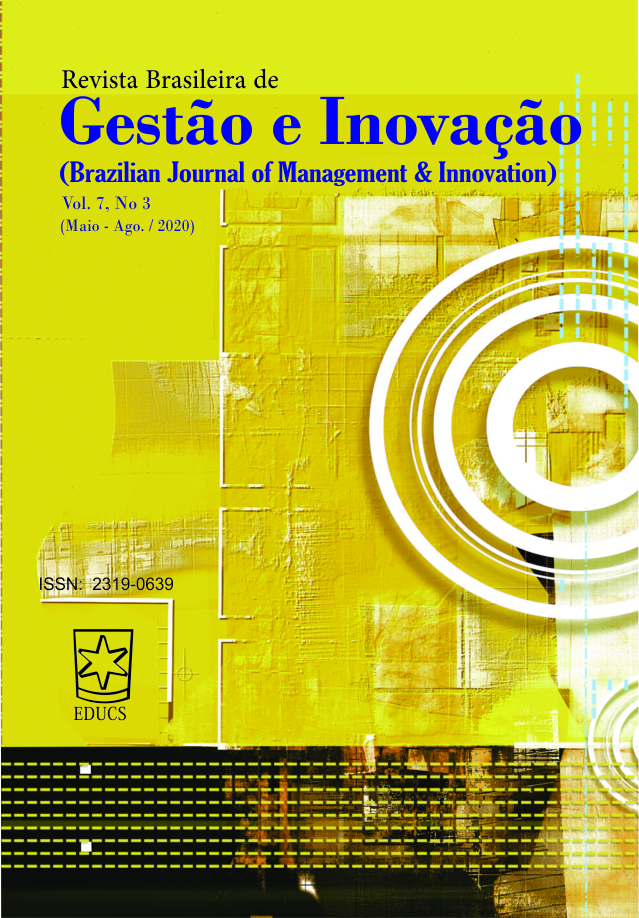QUEM É O EMPREENDEDOR? A BUSCA POR UMA DEFINIÇÃO DO CONCEITO ATRAVÉS DA PRODUÇÃO CIENTÍFICA BRASILEIRA| WHO IS THE ENTREPRENEUR? THE SEARCH FOR A DEFINITION OF THE CONCEPT THROUGH BRAZILIAN SCIENTIFIC PRODUCTION
Keywords:
Empreendedor, Perfil, Características Pessoais, Oportunidade, EmpresaAbstract
Devido ao aumento do número de publicações científicas e não científicas relacionadas ao tema empreendedorismo, a oferta de disciplinas específicas voltadas ao campo em cursos superiores, a predisposição dos brasileiros em empreender e a falta de consenso na literatura sobre o conceito de empreendedor, a pesquisa buscou investigar: Como o empreendedor é reconhecido no campo de Empreendedorismo e Inovação nas pesquisas vinculadas em periódicos nacionais? Em vista de responder esta questão, o estudo teve como objetivo analisar as diferentes definições de empreendedor no campo de Empreendedorismo e Inovação. Como estratégia metodológica, realizou-se uma pesquisa de natureza exploratória qualitativa, utilizando-se do procedimento sistemático denominado meta-estudo. A partir da coleta de dados, identificaram-se 105 artigos relacionados ao tema e após a análise dos mesmos, através de análise de conteúdo categorial, foi possível observar que a maior parte dos estudos analisados ainda reconhece o empreendedor como sendo aquele que cria/abre uma nova empresa, sendo proprietário ou principal responsável por ela. As principais divergências das demais pesquisas apontam para uma conceituação do empreendedor associada à atividade inovadora, visão, desenvolvimento econômico de uma região, identificação de oportunidades e características comportamentais. Cabe ressaltar que a pesquisa considerou os estudos publicados apenas em revistas brasileiras de empreendedorismo e inovação, assim, podem ser indicadas comparações com a literatura internacional em função das discrepâncias e diferenças na conceituação.
DOI: 10.18226/23190639.v7n3.02
Nicoline Pinheiro Fernandes*, Universidade Federal do Rio Grande (FURG). Brasil.
E-mail: nicolinefer@gmail.com
Lívia Castro D'Avila, Universidade Federal do Rio Grande (FURG). Brasil.
E-mail: liviacdavila@gmail.com
Ana Paula Capuano da Cruz, Universidade Federal do Rio Grande (FURG). Brasil.
E-mail: anapaulacapuanocruz@hotmail.com
Errol Fernando Zepka Pereira Junior, Universidade Federal do Rio Grande (FURG). Brasil.
E-mail: zepka@outlook.com
Submetido: Março 2019
Aceito: Junho 2019
*Contato para Correspondência
Downloads
Published
How to Cite
Issue
Section
License
The author must guarantee that:
- there is full consensus among all the coauthors in approving the final version of the document and its submission for publication.
- the work is original, and when the work and/or words from other people were used, they were properly acknowledged.
Plagiarism in all of its forms constitutes an unethical publication behavior and is unacceptable. Revista Brasileira de Gestão e Inovação has the right to use software or any other method of plagiarism detection.
All manuscripts submitted to RBGI - Revista Brasileira de Gestão e Inovação go through plagiarism and self-plagiarism identification. Plagiarism identified during the evaluation process will result in the filing of the submission. In case plagiarism is identified in a manuscript published in the journal, the Editor-in-Chief will conduct a preliminary investigation and, if necessary, will make a retraction.
This journal, following the recommendations of the Open Source movement, provides full open access to its content. By doing this, the authors keep all of their rights allowing Revista Brasileira de Gestão e Inovação to publish and make its articles available to the whole community.
RBGI - Revista Brasileira de Gestão e Inovação content is licensed under a Creative Commons Attribution 4.0 International License.
Any user has the right to:
- Share - copy, download, print or redistribute the material in any medium or format, linking to RBGI site.
- Adapt - remix, transform and build upon the material for any purpose, even commercially.
According to the following terms:
- Attribution - You must give appropriate credit, provide a link to the license, and indicate if changes were made. You may do so in any reasonable manner, but not in any way that suggests the licensor endorses you or your use.
- No additional restrictions - You may not apply legal terms or technological measures that legally restrict others from doing anything that the license permits.
#RBGI







